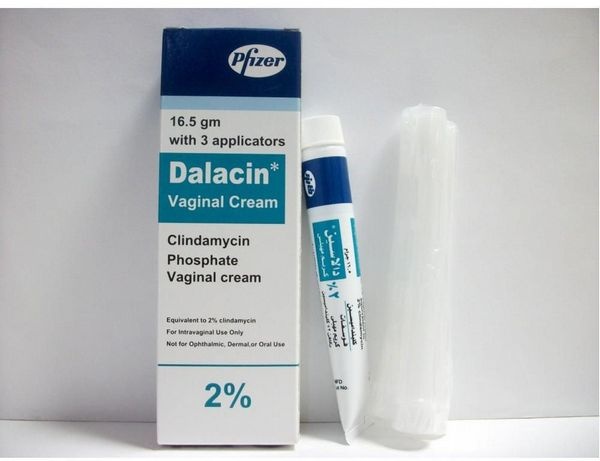
How to use Dalacin
Leaflet attached to the packaging: patient information
Warning! Keep the leaflet! Information on the immediate packaging in a foreign language.
DALACIN (DALACIN C)
20 mg/g (2%), vaginal cream
Clindamycin
DALACIN and DALACIN C are different trade names for the same medicine.
You should carefully read the contents of the leaflet before using the medicine, as it contains important information for the patient.
- You should keep this leaflet, so that you can read it again if you need to.
- If you have any doubts, you should consult a doctor or pharmacist.
- This medicine has been prescribed to a specific person. Do not pass it on to others. The medicine may harm another person, even if the symptoms of their illness are the same.
- If the patient experiences any side effects, including any side effects not listed in this leaflet, they should tell their doctor or pharmacist. See section 4.
Table of contents of the leaflet
- 1. What is Dalacin and what is it used for
- 2. Important information before using Dalacin
- 3. How to use Dalacin
- 4. Possible side effects
- 5. How to store Dalacin
- 6. Contents of the packaging and other information
1. What is Dalacin and what is it used for
Dalacin cream contains clindamycin - an antibiotic with antibacterial action.
The vaginal cream Dalacin is used to treat bacterial vaginosis caused by susceptible microorganisms.
2. Important information before using Dalacin
When not to use Dalacin
- If the patient is allergic to clindamycin, lincomycin or any of the other ingredients of this medicine (listed in section 6).
- If the patient has had colitis after using antibiotics.
Warnings and precautions
Before starting to use Dalacin, you should discuss it with your doctor.
Using the vaginal cream Dalacin may cause the growth of microorganisms in the vagina that are not susceptible to this medicine, especially yeast.
Administering clindamycin, like other antibiotics, is associated with the risk of diarrhea and pseudomembranous colitis, even though the antibiotic is absorbed from the cream only to a minimal extent. The patient should consult a doctor if, during or after treatment, they experience diarrhea, especially severe and persistent. This may be a symptom of pseudomembranous colitis (in most cases caused by Clostridium difficile), a complication of antibiotic therapy. You should not take medications that slow down intestinal motility or have a constipating effect.
It is recommended that during the use of the vaginal cream Dalacin, you should not have sexual intercourse or use vaginal tampons or douching.
Dalacin vaginal cream contains ingredients that may damage rubber and latex products, such as vaginal diaphragms or condoms, reducing their effectiveness in preventing pregnancy or protecting against sexually transmitted diseases, including AIDS. Therefore, it is not recommended to use condoms or vaginal diaphragms during treatment.
Children and adolescents
The safety and efficacy of the vaginal cream Dalacin in children have not been established.
Dalacin and other medicines
You should tell your doctor about all the medicines you are currently taking or have recently taken, as well as any medicines you plan to take. Dalacin vaginal cream may interact with other medicines used at the same time.
If the patient is to undergo surgery, they should inform their doctor about the use of Dalacin vaginal cream. Clindamycin may enhance the effect of muscle relaxants used during surgery.
If the patient is using erythromycin (an antibiotic), they should inform their doctor before starting to use Dalacin vaginal cream.
Due to the lack of data, it is recommended not to use Dalacin vaginal cream at the same time as other vaginal medicines.
Pregnancy and breastfeeding
If the patient is pregnant or breastfeeding, thinks they may be pregnant, or plans to have a child, they should consult their doctor or pharmacist before using this medicine. Dalacin vaginal cream can be used during pregnancy only with the doctor's consent.
Pregnancy
Dalacin vaginal cream may be used in the first trimester of pregnancy only if, in the doctor's opinion, it is absolutely necessary, as the data on the safety of use during the first three months of pregnancy are limited.
Breastfeeding
There is insufficient data on the penetration of clindamycin into breast milk.
In a breastfed infant, it is not possible to exclude the occurrence of severe side effects. Therefore, the doctor will decide whether the patient can take clindamycin and breastfeed at the same time.
Driving and using machines
No studies have been conducted on the effect of the medicine on the ability to drive and use machines.
Dalacin contains propylene glycol, cetyl stearyl alcohol, and benzyl alcohol
This medicine contains 250 mg of propylene glycol in each 5 g of cream (applicator content), which corresponds to 50 mg/g.
This medicine contains 160.5 mg of cetyl stearyl alcohol in each 5 g of cream (applicator content), which corresponds to 32.1 mg/g. Cetyl stearyl alcohol may cause local skin reactions (e.g., contact dermatitis).
This medicine contains 50 mg of benzyl alcohol in each 5 g of cream (applicator content), which corresponds to 10 mg/g. Benzyl alcohol may cause allergic reactions and mild local irritation.
3. How to use Dalacin
This medicine should always be used as directed by the doctor. If you have any doubts, you should consult a doctor or pharmacist.
The recommended dose is 5 g of cream (100 mg of clindamycin), i.e., the contents of one applicator, administered vaginally, once a day, preferably before going to bed, for 7 consecutive days. Depending on the symptoms, the doctor may recommend a shorter, 3-day treatment period.
Method of administration
Always wash your hands before using the cream.

- Remove the cap from the tube.
- Screw one of the single-use applicators onto the tube in place of the removed cap.
- Holding the tube upside down, gently press the cream into the applicator.
- When the plunger stops moving, it means that the applicator is filled.
- Unscrew the applicator from the tube and screw the cap back onto the tube.
- Lying on your back, firmly grasp the applicator and insert it into the vagina as far as possible without feeling discomfort. Holding the applicator, slowly press the plunger until it stops, and the entire contents of the cream are administered.

cervix
- Gently remove the applicator, wrap it in paper, and dispose of it in a waste container. Do not flush the applicator down the toilet.
After using the cream, wash your hands thoroughly.
- After using the cream, wash your hands thoroughly.
Using a higher dose of Dalacin than recommended
In case of taking a higher dose of the medicine than recommended, you should immediately consult a doctor.
You should not use a higher dose without consulting a doctor.
Clindamycin phosphate used vaginally may be absorbed in amounts that cause general side effects (see sections 2 and 4). In case of overdose, you should consult a doctor, who will recommend the appropriate treatment.
Missing a dose of Dalacin
You should not use a double dose to make up for a missed dose. If you miss a dose, you should use the medicine as soon as possible, unless it is almost time for the next dose.
Stopping the use of Dalacin
If you have any doubts about using the medicine, you should consult a doctor or pharmacist.
You should not stop the treatment without consulting a doctor.
4. Possible side effects
Like all medicines, this medicine can cause side effects, although not everybody gets them.
The safety of using clindamycin in the form of vaginal cream has been assessed in clinical trials conducted in non-pregnant women and pregnant women in the second and third trimester of pregnancy. The following side effects have been observed in less than 10% of patients.
Very common(may affect more than 1 in 10 people):
- vaginal and vulvar candidiasis
Common(may affect up to 1 in 10 people):
- fungal infections, yeast infections
- headache, dizziness, taste disorders
- upper respiratory tract infections
- abdominal pain, constipation, diarrhea, nausea, vomiting
- itching (in places other than the application site), rash
- back pain
- urinary tract infections, glycosuria, proteinuria
- abnormal labor
- vaginitis and vulvitis, vaginal and vulvar disorders, menstrual disorders, vaginal and vulvar pain, uterine bleeding, discharge
Uncommon(may affect up to 1 in 100 people):
- bacterial infections
- allergic reactions
- vertigo of labyrinthine origin
- nasal bleeding
- local abdominal pain, bloating with gas discharge, unpleasant odor from the mouth
- urticaria, erythema
- painful or difficult urination
- trichomonal vaginitis and vulvitis, vaginitis, pain in the pelvic area
- abnormal microbiological test results
Frequency not known(cannot be estimated from the available data):
- skin candidiasis
- hyperthyroidism
- pseudomembranous colitis, gastrointestinal disorders, dyspepsia
- maculopapular rash
- endometriosis
- inflammatory swelling, pain at the application site
Reporting side effects
If you experience any side effects, including any side effects not listed in this leaflet, you should tell your doctor or pharmacist. Side effects can be reported directly to the Department of Monitoring of Adverse Reactions to Medicinal Products of the Office for Registration of Medicinal Products, Medical Devices, and Biocidal Products,
Al. Jerozolimskie 181C, 02-222 Warsaw,
phone: +48 22 49 21 301, fax: +48 22 49 21 309, website: https://smz.ezdrowie.gov.pl.
Reporting side effects will allow for the collection of more information on the safety of the medicine.
5. How to store Dalacin
The medicine should be stored out of sight and reach of children.
Do not store above 25°C.
Do not use the medicine after the expiry date stated on the packaging. The expiry date refers to the last day of the specified month.
Medicines should not be disposed of via wastewater or household waste. You should ask your pharmacist how to dispose of medicines that are no longer needed. This will help protect the environment.
6. Contents of the packaging and other information
What Dalacin contains
- The active substance of the medicine is clindamycin. 5 g of cream (applicator content) contains 100 mg of clindamycin in the form of clindamycin phosphate.
- The other ingredients of the medicine are: sorbitan stearate, polysorbate 60, propylene glycol, stearic acid, cetyl stearyl alcohol, cetyl palmitate, liquid paraffin, benzyl alcohol, purified water (see section 2 "Dalacin contains propylene glycol, cetyl stearyl alcohol, and benzyl alcohol").
What Dalacin looks like and what the packaging contains
A tube with a cap, containing 40 g of cream, placed in a cardboard box with 7 applicators.
Each applicator, after filling (one dose), contains approximately 5 g of cream (100 mg of clindamycin).
For more detailed information, you should contact the marketing authorization holder or the parallel importer.
Marketing authorization holder in Greece, the country of export:
Pfizer Hellas A.E.
- L. Mesogeion 243 154 51 Neo Psychiko Greece
Manufacturer:
Pfizer Service Company BV
Hoge Wei
1930 Zaventem
Belgium
Parallel importer:
InPharm Sp. z o.o.
ul. Strumykowa 28/11
03-138 Warsaw
Repackaged by:
InPharm Sp. z o.o. Services sp. k.
ul. Chełmżyńska 249
04-458 Warsaw
Marketing authorization number in Greece, the country of export:21162/2-5-03
Parallel import authorization number: 194/23
Date of approval of the leaflet: 13.09.2023
[Information about the trademark]
- Country of registration
- Active substance
- Prescription requiredYes
- Marketing authorisation holder (MAH)Pfizer Hellas A.E.
- This information is for reference only and does not constitute medical advice. Always consult a licensed doctor before taking any medication. Oladoctor is not responsible for medical decisions based on this content.
- Alternatives to DalacinDosage form: Suppositories, 100 mgActive substance: clindamycinPrescription requiredDosage form: Cream, 20 mg/g (2%)Active substance: clindamycinPrescription requiredDosage form: Cream, 20 mg/g (2%)Active substance: clindamycinPrescription required
Alternatives to Dalacin in other countries
The best alternatives with the same active ingredient and therapeutic effect.
Alternative to Dalacin in Ukraine
Alternative to Dalacin in Espanha
Online doctors for Dalacin
Discuss dosage, side effects, interactions, contraindications, and prescription renewal for Dalacin – subject to medical assessment and local rules.







